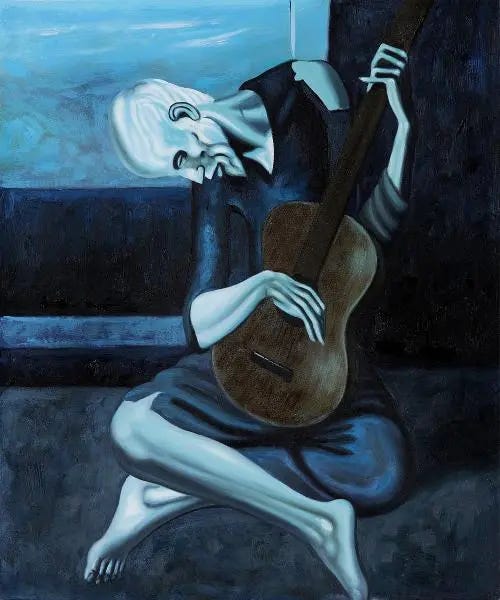Spiritual texts are not the only kind of literature that can nourish our practice. In fact, their pretense sometimes gets in the way. One of my favorite poems about practice isn’t religious or spiritual, and it’s not even about practice. The poem is Wallace Stevens’ “The Man With the Blue Guitar,” which he published in 1937. In the poem, Stevens gives voice to “The Old Guitarist,” a power image that Pablo Picasso painted over thirty years earlier, before he got all wacky and cubist.
The first stanza of the poem goes like this:
The man bent over his guitar,
A shearsman of sorts. The day was green.They said, "You have a blue guitar,
You do not play things as they are."The man replied, "Things as they are
Are changed upon the blue guitar."And they said then, "But play, you must,
A tune beyond us, yet ourselves,A tune upon the blue guitar
Of things exactly as they are."
This is only one of many poems where Stevens seems to sneak up on the dharma, and enter into the life of our practice.
Let’s say that I sit down and try to meditate with the goal of seeing things “exactly as they are.” A laudable mission, given that I usually see the world through my neuroses. Something better, clearer, more honest, must be possible. But I immediately fail the mission. When I sit down with the directive to have unaltered perceptions, my perceptions change. The desire to see things “exactly” imposes a slight flattening. Everything in my field of awareness that is chaotic, fluctuating—emotion, lifeforce—hardens a bit. The field is glassier, cooler. Apparently, unbiased reality has been shot on old film.
Perhaps the issue is that I’m “doing” the perceiving. This is the fault of my egoic self, which I’m told, occasionally, that I should get rid of. So what if I don’t try to perceive? What if I let go of doing anything? It’s cool. I sit there, and the room swims a bit. But there is still the subtle question of what’s really happening, even if I’m not doing it. Am I surrendering to God? In that mood, I can start seeing a gray dignity in things, the tasteful sluggishness of the eternal. Am I seeing raw sense data now? Are things “exactly as they are” things anymore? I am then called towards noticing the glitchy dance of splotches on the far wall as my eyes unfocus. Am I dropping the urge to interpret? That, too, is a flavor, an emotion.
Sometimes, if I’m practicing diligently, the question of interpretation drops away entirely, along with everything else. Even time fails to intrude. It is just: light, wall. Or: black. Or: nothing that can be named. This can be pleasant. But I can’t stay there, I have this life to live. So, I come out of it, and the first thing that comes to me is some interpretation, an idea, a blueness, a story about these voidlike non-moments. They could be a lot of things. Stolen traces of dharmakāya or just cool artifacts of my neurology. But these too are interpretations, different shades of blue. Each of these messages has a different taste.
And it occurs to me that none of these interpretations are my own. Shades of blue are part of the world. They’re filtrations of what I’ve heard other people say about these experiences. Sense data flows in, stories about the sense data flow in—which are also the sense data—and none of it belongs to me, none of it was chosen. The interpretations chew the images, which bleed interpretation, and an attempt to unravel this just adds another layer of complexity. There is no bottom or final answer, or at least, I am too inexperienced to find one. That, if anything, is the song of things exactly as they are, the tune that is ours and not.




